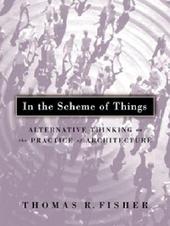
|
In The Scheme Of Things: Alternative Thinking on the Practice of Architecture
Paperback / softback
Main Details
| Title |
In The Scheme Of Things: Alternative Thinking on the Practice of Architecture
|
| Authors and Contributors |
By (author) Thomas R. Fisher Fisher
|
| Physical Properties |
| Format:Paperback / softback | | Pages:176 | | Dimensions(mm): Height 203,Width 152 |
|
| Category/Genre | Theory of architecture |
|---|
| ISBN/Barcode |
9780816636549
|
| Classifications | Dewey:720.1 |
|---|
| Audience | |
|---|
|
Publishing Details |
| Publisher |
University of Minnesota Press
|
| Imprint |
University of Minnesota Press
|
| Publication Date |
1 February 2006 |
| Publication Country |
United States
|
Description
In each of the twelve essays that comprise this timely volume, Fisher addresses issues of vital concern to architects and students, offering hard-hitting criticism and proposing innovative and practical ideas for reform at the level of both the individual practitioner and the profession as a whole. Through his thoughtful and nuanced consideration of architecture's ideological foundations and its relationship to ecology, politics, and technology, as well as his subtle understanding of the architect's interior life, Fisher challenges the demoralized design community to recapture its historical role as steward and visionary of the public realm.
Author Biography
Thomas R. Fisher is dean of the College of Architecture and Landscape Architecture at the University of Minnesota and a contributing editor of Architecture Magazine. He is the author of Salmela Architect (Minnesota, 2005).
Reviews"Those who think that present-day architecture is 'numbed by an ugly and shoddily constructed built environment' are encouraged to read Thomas R. Fisher's In the Scheme of Things from the University of Minnesota Press. Twelve essays chart vital concerns in ecology, politics, and technology and reassess the way architects need to think of themselves, concluding that instead of demoralised, cubicle-based plan-mazufacturers, they should reinvent themselves as stewards and visionaries of the public realm. Often provocative, this book is full of ideas that, if implemented, might vastly improve the way we live now, judging from the author's previous essays." -The Art Newspaper "The forms of architectural practice and the education of architects are all too rarely scrutinized. This book seeks to address the oversight. Modest, carefully written, and refreshingly jargon-free, it connects those issues and considers them primarily in the context of North America to present a claim that architecture is in a state of crisis." -Azure
|